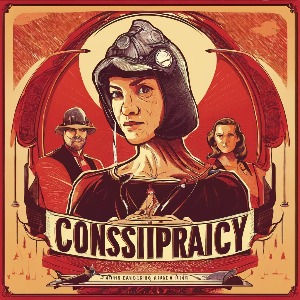Picking at Conspiracy Theories.
- Anuja Lavand
- Apr 14, 2024
- 4 min read
Originating from the Latin word ‘Conspirare’- A conspiracy is a secret plan by a group of people to do something bad or illegal.
A Conspiracy theory on the other hand is a belief that some secret but influential organization is responsible for an event or phenomenon, often political.

Sometimes also referred to as a plot, scheme, ruse, or ploy. Often used in a negative context, the term “conspiracy theory” ironically is the subject of a conspiracy theory.
Micheal Barkun, a political scientist, states that they, “are a template imposed upon the world to give the appearance of order to various events that occur.”
//How does conspiracy theory differ from conspiracies?
Conspiracy theories include opposition to mainstream ideas- especially ones given by the ones who can verify them. Ex. Historians, Archaeologists, etc.
They are particularly designed to resist falsification, where both lack of evidence and evidence against the theory are misinterpreted and used in a way beneficial to the conspirator.
Stephen Lewandowsky, a psychologist says, “Interpretation relies on the notion that the stronger the evidence against a conspiracy, the more the conspirators must want to believe their version of the truths, it goes on to become a matter of faith rather than something one can prove or disprove.”
//The Belief in Conspiracy Theories
Belief may not be based on evidence but rather on the faith of the believer.
Conspiracy theories are most successful when perpetrators can gather followers from the general public, especially in the fields of politics, religion, and journalism.
They appeal to emotion, reinforce pre-existing beliefs, , and focus on gaps or ambiguities in knowledge, Giving birth to extreme or uncompromising views, they make believing groups even more intense, sometimes even inspiring violence.
Acutely seen in the vulnerable and disadvantaged, these speculations make situations worse more often than not. Commonly advocating feelings of alienation, unhappiness, dissatisfaction, unconventional worldview, and disempowerment.
//Culture
A 2020 article says that unfounded belief is common across historical and contemporary cultures, it arises from human tendencies to gossip, group cohesion, and belief in religion.
Another historical study states that “Aversive feelings that arise when in crisis- fear, uncertainty and the feeling of being out of control- stimulate a motivation to make sense of the situation- increasing likelihood of perceiving conspiracies in social situations.”
//History
The themes of historical conspiracies include prejudice, propaganda, witch hunts, wars, and genocides, which are allegedly strongly believed by perpetrators of conspiracy theories.
They emerged as a cultural phenomenon in the late 20th and 21st centuries. Some studies suggest that the term is in use from as early as the 19th century and the nature has always been derogatory.
Once limited, conspiracy theories are now common across mass media, the internet, and platforms of social media.

Traditionally, conspiracism has entailed a ‘theory’, but over time, ‘conspiracy’ and ‘theory’ have become decoupled as modern conspiracism is often without any kind of theory behind it.
//Psychology
Psychologically, conspiracy theories show a distrust of authority and political cynicism, often involving projections of undesirable characteristics onto conspirators.
Exposure to harmful theories regularly may cause neural pathways to become more rigid and less subject to change. Repetition of them reinforces the rigidity, it can cause changes in the way people think- it is a form of brainwashing.

This is how fanatics are born- further they try to confirm their beliefs by seeking out truths, they try to avoid conflict on the subject, and turn contrasting information to fit their belief.
//
Theorists try to make people believe that they have privileged access to socially persecuted knowledge or a stigmatized mode of thought that separates them from the masses who believe the official account.
Conspiracy theories explain what institutional analysis cannot. These theories appear to make sense out of a confusing world, appealing to the masses and showing a prominent dark and light side.
Presented as special, secret knowledge, it makes them more attractive and gives meaning to an otherwise strange world.
There is also a personal need, “to explain a significant event with a significant cause”.
Real Conspiracies are difficult to conceal and routinely experience unexpected problems. Conspiracy theories are unrealistically successful wherein groups of conspirators can act with near-perfect competence and secrecy, here the causes of events or situations are simplified to exclude factors as well as the role of chance and unintended consequences. All observations are explained as having been deliberately planned. Similarly as shown in the movies.

//How do they work?
Conspiracy theories explain what institutional analysis cannot, simplifying causes to exclude factors and attributing all observations to deliberate planning. New evidence is seen as part of a cover-up, contradictory information as disinformation, and lack of evidence as confirmation.
//Web References
Common thought streams across the internet involve the 1969 Apollo Moon Landing, Theories regarding the dark web, the Illuminati, AI, natural phenomena, famous murders, cults, the matrix, etc. Mentions of the New World Order or New World Commission are also seen, popularised during the Cold War, showcasing one world government and belief in a cabal responsible for the same.

People usually watch conspiracy theories as a part of entertainment or curiosity. Comments call it a form of storytelling or an art of narration, compelling to various emotions.
//Positives
One of the major positive sides of conspiracy theories is that they make people question political systems and quite sometimes expose corrupt people in the government. They make people curious leading them to question the system and not have blind faith in the information that is provided.
Official people are put under pressure to respond quickly to critical situations quickly, thus also providing help for those in need.
Whether people believe in the negatives or positives is a matter of personal consideration, stimulating critical thought and faith reflection.

References:
Barkun, M. "A Culture of Conspiracy: Apocalyptic Visions in Contemporary America."
2. Lewandowsky, S. "The Role of Conspiracist Ideation and Worldviews in Predicting Rejection of Science"
Comments